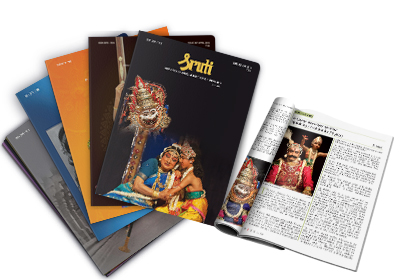
For years a musicians’ musician, one of very few concert vocalists offering regular samples of the music of the Dhanammal music, she was virtually born again in the 1990s as an iconic singer with a powerful voice she virtually rediscovered with the help of German voice expert Prof Eugene Rabine. Until then struggling to attract sizable audiences with her pristine music, she became a huge popular draw with her made-over voice and repertoire.
Born in Mumbai into a Tamil family deeply into music, Aruna had her earliest music lessons from her mother Rajalakshmi Sethuraman. Her father, a connoisseur of arts, hosted leading classical musicians and dancers at home, especially south Indian artists visiting Bombay. Aruna met her guru-to-be Sangita Kalanidhi T Brinda, when she was a guest in her Bombay home. That is how Aruna acquired the Dhanammal bani.
Aruna won her first award, a gold medal, when she was barely eight—at the Shanmukhananda Sabha Competition. She was 14 when she gave her first solo concert at the Rama Navami festival, Bhajana Samaj. At 21, she won the Madras Music Academy’s Best Young Musician Award during the December season.
Aruna’s early musical style was an admixture of Brinda’s Dhanammal school and the Bombay influences, including the excellent tutelage she received from Bombay Ramachandran and AS Mani Bhagavatar, a sishya of Tiger Varadachariar. She also honed her prowess in swara and pallavi singing with lessons from Prof. TR Subramanyam, then based in Delhi. Another revered mentor was veena vidwan KS Narayanaswamy. She built up an admirable repertoire of padams and javalis during her training under Brinda, in addition to kritis in some of their chastest versions. She acquired both a deep appreciation of the nuances of ragas and considerable elegance in the rendering of swaraprastara from these outstanding teachers.
According to her own website, “Her musical perceptions were enriched by exposure to film, western and Hindustani (Northern Indian) classical music. She ushered in a new approach to concert presentation, extending the boundaries of the Carnatic repertoire while remaining firmly rooted in the classical grammar and tradition of this great art form.”
The tipping point of Aruna’s life occurred when she came into contact with Prof. Rabine during her quest for a trainer to help her exploit the potential of her voice fully. The rest is history.
Other voice experts she has benefited from include Sangita Kalanidhi M Balamurali Krishna and New York-based David Jones.
To expand her repertoire and add new dimensions to her music, Aruna has sought and received guidance from such varied sources as the late Pallavi Venkataraman and nagaswara vidwan Semponnarkoil SRD Vaidyanathan who helped her with her research into Mallari.
It was veteran vocalist Needamangalam Krishnamurthy Bhagavatar—who spent months in Aruna’s Mumbai home—that gave her the valuable legacy of the compositions of Oottukadu Venkatasubbier. Like Chitravina N Ravikiran, Aruna has played a key role in propagating the Kavi’s “brilliant, yet relatively neglected compositions” on the contemporary concert stage.
Aruna has performed at the most prestigious venues all over India and abroad. Known for her theoretical knowledge and articulation, she regularly participates in lecture-demonstrations on her art and has been a veritable ambassador of Carnatic music worldwide. In 2011, she became the first Carnatic vocalist to perform at London’s Royal Albert Hall. She has also sung at New York’s Carnegie Hall, the Théâtre de la Ville in Paris, and Morocco’s Festival of World Sacred Music. Her collaborations with Dominique Vellard, a master of Gregorian and medieval song, and the Moroccan Sufi vocalist Noureddine Tahiri have been among the more spectacular of her collaborative efforts.
The recording of Aruna – Thousand Names of Divine Mother, a concert, was done in the crypt of a Benedictine monastery in Germany in collaboration with Christian Bollmann and Michael Reimann.
She has also partnered the popular film musician Shankar Mahadevan and the brilliant mandolin artist U Shrinivas, in duets across the land.
Aruna has received many national and international awards. These include the Padma Shri and the US Congress Proclamation of Excellence. She is widely expected to be honoured with the Sangita Kalanidhi title in the foreseeable future.
Aruna Sairam’s strong and reverberant voice is indeed a rarity among Carnatic vocalists, often appealing to a new and enthusiastic breed of listeners.


